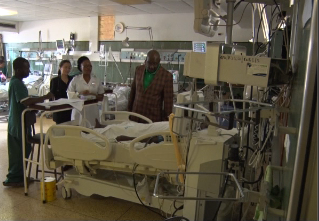… as fears of politicisation of health products grows
The Community Working Group on Health (CWGH) has commended government for
making blood and blood products free in public health institutions beginning next month, but expressed concern over the unclear funding mechanism for the drive.
By Michael Gwarisa
CWGH executive director Itai Rusike said the high cost of blood has been one of the major barriers that prevented ordinary Zimbabweans from accessing and enjoying their health entitlements and rights as enshrined in the country’s Constitution which stipulates that health is a right.
He however said government should come clear as to how they intend to fund the free blood subsidy.
“However, notwithstanding the good intentions, the public would however like to know how the government – already saddled by external debt and a collapsing national economy – will fund the subsidy on blood? Where is the money coming from?
“Will the money come from national fiscus, AIDS Levy, Health Levy or Health Development Fund? Is
the subsidy funded by external partners? For how long? And how sustainable is the free blood
initiative?” said
He added that without answers to the above queries, CWGH remains concerned about the feasibility and
sustainability of this very nobble initiative because such a pronouncement has to be backed with a
strong financial purse.
“What measures has the government put in place to make sure blood will always be available given that it has been always in short supply even when being sold? Making a pronouncement without explaining the modalities is not enough.”
He added it was critical for the Ministry of Health and Child Care (MoHCC) to come out clean and explain the source of funding and the sustainability of this noble initiative for the sake of transparency, accountability and good governance.
“We fear that free blood initiative will go down the “user fee policy” of pregnant mothers under 5s and those aged 65 years and above which remained in most areas a political pronouncement.
“In 1980 free health care was introduced for those on low incomes (below $Z$150, then worth US$220). The policy position on user fees has been that those who can afford to pay for services should do so but implementation of the principle has been mixed.”
Meanwhile, the policy of free public sector care at rural clinics is still in force, although most mission and local authority clinics do not follow it hence this has been mainly funded by development partners through the Results-Based Financing (RBF) funded by the World Bank and the Health Development Fund (HDF) a basket fund by multiple donors such as DFID, EU, Swedish Government and the Norwegian Government.
However, in some health institutions mothers continue to be detained after delivery and Child Birth Records being withheld at public health institutions after failing to pay fees.
“It is against this background that CWGH demands that government explains fully the source of funding and the modalities to avoid the pitfalls of the “user fee policy” which has not been fully embraced and implemented for the benefit of the vulnerable groups it is supposed to serve.
“We need a separate budget line allocation from the national health budget to fund the free blood
policy to public health institutions!!!”
He however said the move to make blood free would lessen financial strain on patients and preventing avoidable deaths that have been occurring in the country as patients failed to access blood because of its high cost.
“The government’s subsidy on blood therefore comes as relief considering the high number of people that are dying in public hospitals after failing to buy blood while families have been disposing priced possessions for a song to save the lives of their loved ones.
“It is commendable that government has since last year been gradually reducing the cost of blood to
ensure that it is within the reach of the ordinary person from $150 a pint in 2016 to the current $50
a pint, with the ultimate aim of making it totally free by next month.”
He added that the free blood initiative was a welcome move as it shows the government’s political will and total
commitment to Universal Health Coverage (UHC), which entails all people and communities accessing health care without financial hardships.










